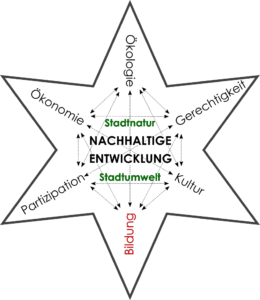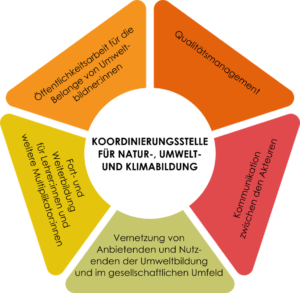FREQUENTLY ASKED QUESTIONS (FAQ)
Any questions? We can certainly help you!
Environmental education? Green places of learning? Urban nature?
You still can't really imagine what all these terms mean?
Don't worry - that's what we're here for!
We have the answers to all your questions.
Here you'll find everything you need to know about our "NATURE CITY BERLIN".
Answers to your questions about environmental education in Berlin
What exactly is nature, environmental, climate and sustainability education?
Colloquially, "environmental education " stands for nature, environment, climate and sustainability education and does exactly what its name suggests. It brings us closer to our nature and environment. On the one hand, this refers to the animals and plants in our surroundings, but on the other hand it also takes a global view of how our actions and our way of life influence the world around us and vice versa. The term "environmental education" refers to an educational approach that addresses human intervention in the natural environment and the resulting problems and teaches a responsible approach to natural resources and the environment.
In the course of the development of environmental education, there have been different currents, especially in the 1970s, which initially led to a great variety of terms (e.g. environmental education, environmental learning, ecological learning, eco-education, nature education). Today, the term environmental education has gained acceptance and can be considered a collective term for different environmental education concepts. The communication of complex ecological interrelationships is an essential task of environmental education. In order to identify the "disturbing factors" that have an influence on nature and the environment, thinking in interrelationships and the recognition of lawful processes are required. Equally important is the ability to reflect, questioning social and one's own actions. This also includes assessing human actions and the associated influence on nature and the environment.
In many countries, environmental education is being replaced by the term Education for Sustainable Development (ESD). Education for Sustainable Development stands for an education that enables people to think and act in a way that is fit for the future. It enables each individual to understand the impact of their own actions on the world. The focus is on various questions. For example: How do my decisions affect people of future generations in my community or in other parts of the world? For example, what is the impact of how I consume, what means of transportation I use, or what and how much energy I use? What global mechanisms lead to conflicts, terror and flight? Or what can we do about poverty? ESD should enable people to understand the impact of their own actions on the world and to make responsible, sustainable decisions.
However, the scientific discourse on how the two educational concepts are interrelated is still in full swing and not even at the beginning. Therefore, it is only logical if the sustainability triangle economy, ecology and social is expanded. The extension defines the term "social" a little more precisely.

Extension of the sustainability triangle to a sustainability star
by Dr. Becker, University of Osnabrück.
Education, culture, participation and justice are to be understood as equal partners in the sustainability star.
Why do we need environmental education?
Especially in the city, between brightly painted concrete and neon lights, nature around us is sometimes forgotten. When we walk through the city every day, we often fade out hundreds of animals and plants that also have their home in our midst. We often forget that they play an important role in our urban climate. Environmental education is a way to develop closeness to this urban nature that surrounds us or to be able to discover it in a completely new way. Urban nature has a concrete impact on the quality of our urban living space, it improves the air and provides cooling and shade in summer. Moreover, it contributes significantly to the fight against the consequences of climate change (such as heat waves) especially in big cities. It also provides an important counterbalance to hectic city life and is good for everyone's health. But environmental education is also community. Gardening together in raised beds and learning together about it brings people together and creates an antipole to the anonymity of the big city.
Apart from our personal circumstances, nature, environment and climate education also broadens our horizons globally. How we and our lifestyles affect nature, people, and the climate far away is as much a core topic of environmental education as discovering urban nature on our own doorstep. In recent decades, it has become increasingly clear that we as individuals and as a society have a responsibility through our impact on the lives and survival of people, animals, and plants across the planet. We have to make conscious choices about how we use that influence. Nature, environmental and climate education creates this awareness and enables us to better decide how we want to live.
What is meant by urban nature?
There are different perspectives on what 'nature' means. A deep forest is very different from a cultivated landscape where crops are grown or animals graze on green pastures. Both habitats allow completely different animal and plant species to live. The same applies to nature in our big cities. We often don't notice how many trees there are, not only in the parks of Berlin, but also along the roadside. We quickly overlook the fact that wild wasteland is a very special habitat for all kinds of rare plants and animals. The cracks in house walls and the roof gables of our homes provide a habitat and shelter for birds and insects.
Bees and bumblebees cavort on our balconies. In the city, in contrast to the countryside, many small but extremely diverse habitats come together, like in a small-scale mosaic. As a result, special species are often found in the city. Those hardly exist outside of it, and the diversity of species is also impressively high. We rarely perceive how special and diverse urban nature is. It invites us to marvel and discover.
Why does Berlin have a mission statement for environmental education and what does it say?
The mission statement for environmental education is fully written out as: Mission Statement for a Green and Sustainable Berlin. The principles and goals of nature, environmental and climate education lead to a more conscious and sustainable approach to our nature and environment and thus to better coexistence in our society. Likewise, the mission statement leads to an awareness of how important sufficiently available and high-quality urban nature is for human health and for the challenges of climate change in the city. It is necessary to better protect, preserve and develop the valuable urban nature.
The mission statement sets up a basis for the people who create green learning spots and offer environmental education. It helps to carry their values and content into society, and supports the valuable cultural and social work for a shared future worth living in the city. Nature, environmental and climate education are firmly anchored in Berlin's educational landscape through the mission statement for a green and sustainable Berlin. Berlin is a city rich in nature and diverse structures and should remain so.
What are green learning spots?
We can find a green learning spot wherever flora and fauna have taken up residence in the city. Surprisingly, these spots are not always particularly rich in plants (e.g. gardening schools or forest schools). Even barren, sandy wastelands, which often seem lifeless, provide particularly attractive habitat for many wild insects and rare native plant species of this region. But flora and fauna are not the only topics covered by the environmental education and learning spots. A repair café, a solar or mobility project, or a community kitchen for sustainable food can be just as much a green learning spot, presumed that sustainability and other nature, environmental, and climate education topics are the focus. A few plants never hurt the ambience, though.
What is the role of the environmental education coordination offices?
We as Berlin coordination offices want to give every person in the city a positive moment in direct contact with urban nature and environment. By that, the vital and positive appreciative bond between people, nature and the environment is strengthened. We as coordination offices for nature, environment and climate education offier a network for teachers and those willing to learn. We advise people who would like to get more involved with urban nature and refer them to those who are experts in this field. But you can learn not only from experts, but also from each other. People who want to start a green project together can also find support and advice from us, whether it's a neighborhood community garden or a school class that wants to find out if they can grow something in their schoolyard.
People in all districts of Berlin should have the opportunity to experience nature, environmental and climate education and to experience urban nature. That is why we support the expansion of environmental education in the districts, organize further education and build networks, in accordance with the mission statement for a green and sustainable Berlin. We work to ensure that the green infrastructure is not neglected and that habitats for animals and plants are preserved and expanded.
In essence, the tasks of the districts' coordination offices for environmental education can be assigned to five main tasks.

Who can benefit from the offers?
The offers of nature, climate and environmental education are aimed at all people of any age. No matter if you simply want to get to know and experience more nature in your district or are interested in certain topics and would like to learn more about them. In Berlin we will find a suitable offer for you – for everyone. Environmental education is social, inclusive, anti-racist, barrier-free and anti-discriminatory.
Are there also offers that build on each other?
Many topics build on each other or are connected with each other, but it is possible to start almost always and everywhere. It is important to find out for yourself which topic you are interested in and enthusiastic about. Since all topics of environmental education are interwoven, the entry into other topics results quite by itself. Most of the offers always provide you with interesting contents. No matter, whether you are a newcomer or already an active person with previous knowledge and experience. There are also special series of offers that build on each other and offers where prior knowledge is helpful. If an offer requires prior knowledge, the actors point this out. Nature, environmental and climate education offers usually are very personal and close to the people. It is about the community. The contributors of environmental education try to involve everyone, regardless of their level of knowledge.
How much does it cost?
The advice and support provided by the coordination offices is free of charge. Environmental education programs are mostly free of charge, but some may still require a small participant fee. For offers with a high expenditure of time or material, such as vacation care or courses on handicrafts, it can also be a little more. Almost all contributors in nature, environmental and climate education operate on a non-profit basis or are part of a non-profit organization.
I am looking for something very special! What can I do?
Call our colleagues in the desired district or write an e-mail. You can also make an appointment and come by. We will be happy to help you find exactly what you are looking for in your district or in the whole of Berlin.
Would you like to learn more? Then click on the button here and you will be taken directly to our contact persons, who are always happy to help you!